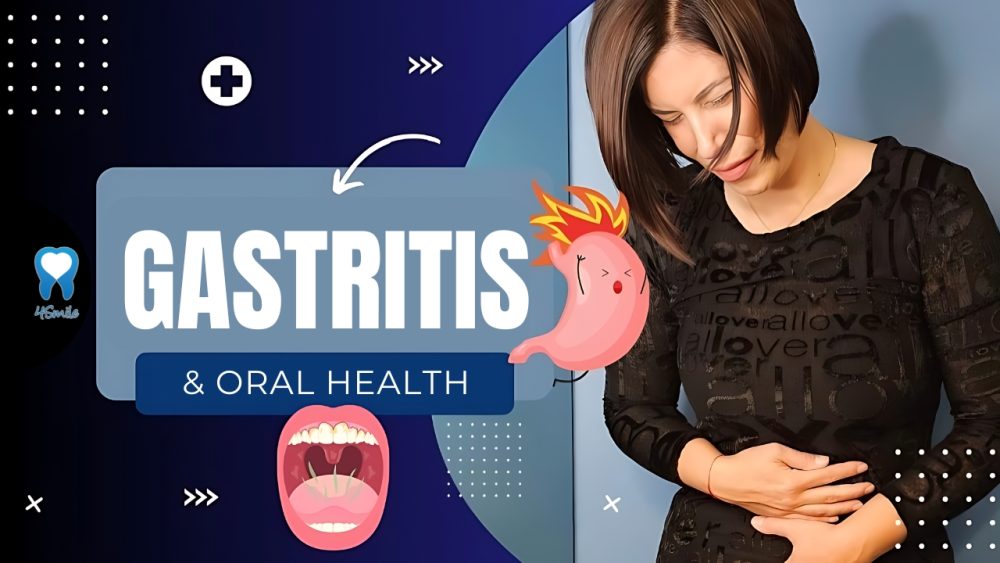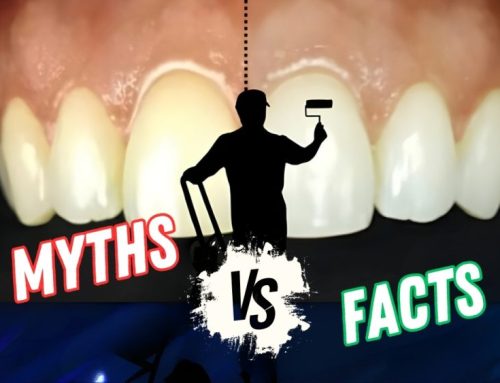Gastritis, also known as a disease of the modern age, is one of the most common and widespread conditions. The fast-paced lifestyle, prolonged exposure to stress, and poor dietary habits are the most common causes of this stomach lining inflammation, which can significantly impact your quality of life.
While most people associate gastritis with digestive discomfort almost exclusively, it’s important to recognize that its effects extend beyond the stomach.
In this week’s blog by Dental Center 4Smile, dental clinic in Croatia, learn how gastritis can affect your oral health and why it’s crucial to take care of your oral health if you suffer from gastritis.
WHAT IS GASTRITIS?
Gastritis is, simply put, an inflammation of the stomach lining.
There are two types of gastritis: acute (sudden onset with shorter duration symptoms) and chronic (developing gradually over a longer period).
The main causes of gastritis are often linked to irritants such as excessive alcohol consumption, smoking, stress, certain medications, and bacterial infections like Helicobacter pylori.
The stomach lining plays a key role in protecting the stomach from the strong acid it produces to digest food. When this lining becomes inflamed, it can lead to various digestive symptoms like stomach pain, bloating, and nausea.
However, the consequences of gastritis don’t stop at the stomach!
HOW DOES GASTRITIS AFFECT ORAL HEALTH?
Besides causing uncomfortable symptoms that reduce your quality of life, some symptoms of gastritis also affect your oral health:
1. Acid Reflux:
One of the most common symptoms of gastritis is acid reflux.
When stomach acid rises through the esophagus, it can often reach the mouth, causing a sour or bitter taste.
Over time, this strong stomach acid can cause tooth erosion.
Tooth erosion manifests as damage to the enamel, increasing the risk of cavities and tooth sensitivity.
Tooth erosion can also cause tooth sensitivity and even tooth fractures.
2. Dry Mouth:
Gastritis and its treatments can cause dry mouth, a condition where there isn’t enough saliva to keep the mouth moist. Saliva plays a crucial role in protecting teeth by neutralizing acids and washing away food particles.
Reduced saliva production increases the risk of cavities and gum diseases – gingivitis and periodontitis!
3. Oral Infections:
A weakened immune system, often associated with chronic gastritis, can make you more susceptible to oral infections.
Gum infections like gingivitis or periodontitis can develop from an overgrowth of bacteria in the mouth, causing gum inflammation, bleeding, and bad breath.
If you notice symptoms of gum inflammation, it’s important to see a dentist as soon as possible because untreated gingivitis can progress to periodontitis. Even if you develop periodontitis, remember that with the expert help of Dr. Ivan Antolković, its progression can be significantly slowed!
4. Nutrient Deficiencies:
Gastritis can interfere with your ability to absorb essential nutrients like vitamin B12.
Deficiencies in these nutrients can lead to a wide range of oral health problems.
Some of the problems include gum diseases, mouth ulcers, and increased risk of infections.
5. Bad Breath:
The combination of stomach acid, dry mouth, and potential oral infections can contribute to chronic bad breath, also known as halitosis.
Bad breath can negatively impact your confidence in social circles.
HOW TO CARE FOR YOUR ORAL HEALTH IF YOU HAVE GASTRITIS?
Now that we have explained the connection between gastritis and oral health, here are important strategies to protect your smile while dealing with gastritis:
1. Control Acid Reflux:
If you have symptoms of gastritis, it’s important to seek medical help.
An expert will suggest lifestyle changes, medications, or dietary adjustments to manage acid reflux caused by gastritis.
2. Stay Hydrated:
To combat dry mouth symptoms, make sure you always drink enough water.
Besides water, using sugar-free gum can also help stimulate saliva production. However, be cautious that the sugar-free gum is not too spicy or aggressive for your sensitive stomach.
3. Maintain Thorough Oral Hygiene:
Stick to your regular oral hygiene routine without exception.
Brush your teeth at least twice a day for two minutes with fluoride toothpaste.
Use a soft-bristled toothbrush to avoid further damaging the tooth enamel and floss or use an oral irrigator daily.
Even when you don’t have access to your oral hygiene tools, rinse your mouth with water!
4. Regular Dental Checkups:
Regular dental checkups are crucial for maintaining any healthy smile, especially one affected by the consequences of gastritis.
Visit your dentist in Zagreb, Dr. Ivan Antolković, for regular checkups and dental tartar cleaning every six months or at least once a year.
Dr. Ivan Antolković will help you detect and address oral health issues at an early stage before they develop into serious problems for your smile.
In this way, you will ensure that your smile remains healthy, along with gastritis.
5. Take Nutritional Supplements:
If you have nutrient deficiencies due to gastritis, consider taking supplements or making dietary changes to address them.
Always consult a specialist to determine the best approach for your case.
6. Manage Stress:
Chronic stress can worsen gastritis and indirectly affect your oral health. Explore healthy techniques for stress reduction like meditation, yoga, or deep breathing exercises.
7. Quit Smoking:
If you smoke, quit this harmful habit.
Some studies have shown that smoking can negatively impact your stomach, especially if your gastritis is caused by Helicobacter pylori bacteria.
Smoking irritates your stomach lining, exacerbates acid reflux, and causes dry mouth.
Therefore, quitting smoking benefits not only your stomach but also your oral health.
CONCLUSION
Although gastritis may seem like a problem focused on the stomach, it can significantly impact your oral health. Acid reflux, dry mouth, oral infections, nutrient deficiencies, and bad breath are just some of the ways gastritis can affect the health of your smile.
To protect your smile and quality of life, it is important to effectively manage gastritis and adhere to good oral hygiene practices.
Remember, your stomach and oral health are interconnected. Taking care of one can help protect the other. If you’re concerned about the impact of gastritis on your oral health, our expert dentists Ivan Antolković and Mia Radić will provide you with advice and support.
Your body – and your smile – will thank you.














